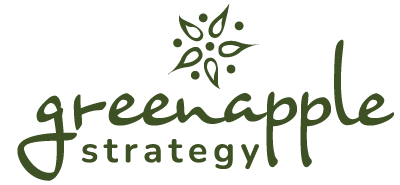Planning a special event can be overwhelming if you’re not sure where to start. Green Apple Strategy has more than a decade of experience solving problems through a variety of strategies and tactics—including event planning. From conceptualization to day-of logistics for in-person or virtual events, our team has learned many valuable lessons along the way. Here are our pro tips to make the most out of your next event!
First Things First
When planning an event, it’s tempting to jump straight to fun stuff like decorations, color schemes, and signature cocktails. But in the words of Stephen Covey, let’s put first things first.
Before contacting venues and vendors, the date, time, approximate guest count, and budget need to be locked down. Now is a good time to start a spreadsheet to track invoices and payments from the very beginning. Next, create a timeline to help everyone involved stay on track throughout the planning process. Finally, think through items that will need to be designed. This may include save-the-dates, invitations, event logos, menus, branded items and décor, programs, handouts, signage, name tags, and other print or digital materials.
Pro Tip: Always get approval from your client before you design or book anything.
Planning Your Event
Once the date, time, budget, and guest count are determined, it’s time to move on to the details. Begin by asking your client to create the guest list and, if needed, offer your suggestions of people who should be included. If the event should be pitched to the media, you can include them on the invitation list as well.
Select a venue and determine food and beverage options. It can be helpful to ask the venue if they have any preferred vendors, as well as what chairs, tables, and linens they already have available. You also want to consider your venue when choosing entertainment, or vice versa. Consider music, photo booths, videos, and speeches. Each has different AV requirements to consider for making your event a success.
Now that your key decisions are made you can begin communicating with invitees via a platform that makes sense for your event. You may need one with just RSVP capabilities, or you may need to sell merch and tickets, too. Plan on sending invitations at least 30 days before the event. Follow up with a reminder email two to three days before the RSVP deadline, a second reminder email two weeks out from the event, and a final reminder email the day before or the day of the event.
Finally, it’s time to add extra details that help make your event one of a kind. Consider creative décor and meaningful gifts for guests. Photography and videography can also surprise and delight if used correctly, such as part of live social media feeds, as complimentary takeaways, or in post-event videos.
Pro Tip: Check on requirements for event insurance, security, and any necessary permits or licenses.
Begin Marketing Launch
Now is the time to begin planning your PR strategy, so you’ll need to determine what press releases will go out, when they’ll go out, and what venues they’ll be featured in. Social media strategy is also a key part of event promotion. Create a content calendar to begin attracting attention well before the event is scheduled. And don’t forget about short videos! These can be used on several platforms to increase anticipation and serve as a sneak peek of the event. Finally, an email marketing strategy should be planned, designed, and deployed to pique the interest of your client’s email list. Don’t be afraid to provide multiple reminder emails with key pieces of information that attendees will need.
Day-Of Logistics
Before the big day arrives, think through key logistics. Planning a couple of walk-throughs well in advance will help you mentally plan out the space before crunch time, including check–in and parking. You’ll need to plan where guests will enter and what they will do immediately upon arrival. Will they need wristbands, tickets, or an ID? Do you need a scanner, a cash box, or additional supplies for a smooth process?
Regarding parking, consider whether self-parking or valet will work best for your event—and let guests know ahead of time. You can even station event staff in the parking lot to assist if needed.
Pro Tip: Always give yourself extra time the day-of to set up and ensure everything is in order.
Post-Event Follow-Up
As part of your post-event follow-up, take to social media to recap the event. Plan out and schedule content, photos, and captions to build engagement with attendees and spread awareness for next time. It’s also a great practice to send thank you notes to everyone you worked closely with, including colleagues, clients, and vendors.
Pro Tip: Schedule a debrief session as soon as possible to make notes on what worked well and what can be improved upon while everything is still top-of-mind.
Canceling or Postponing Your Event
Sometimes things happen that are beyond your control. Even the best-laid plans can be subject to bad weather, health concerns, or scheduling conflicts. If the decision is made to cancel or postpone the event, there are steps you can take to mitigate confusion and keep your audience informed.
Let Green Apple Plan Your Next Event
Special events are a powerful tool that can be used to enhance your marketing goals. If you’re ready to build connections while increasing brand awareness, reach out to us for a consultation.


